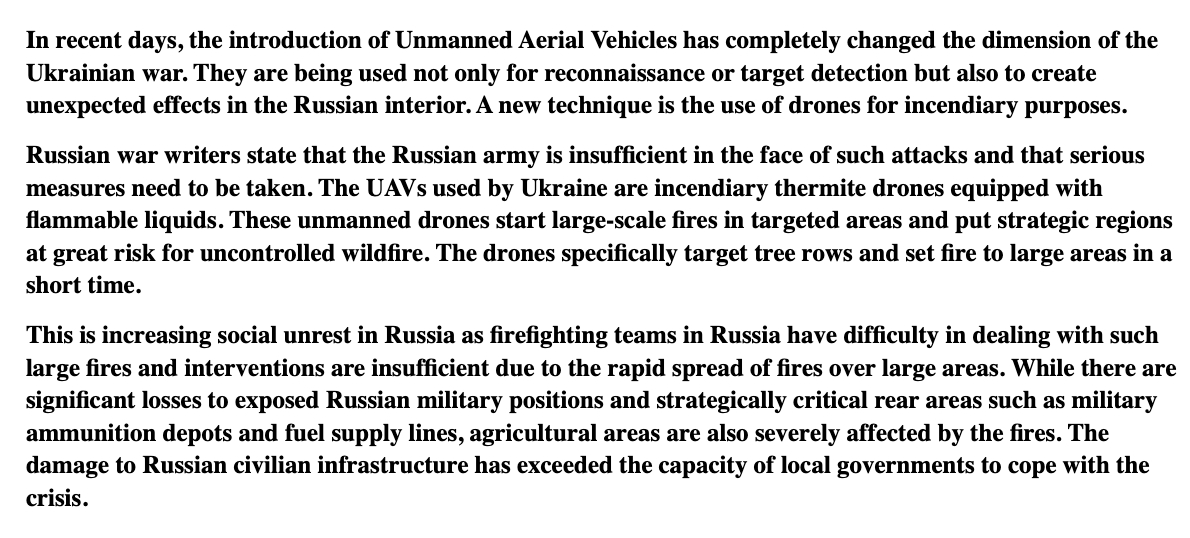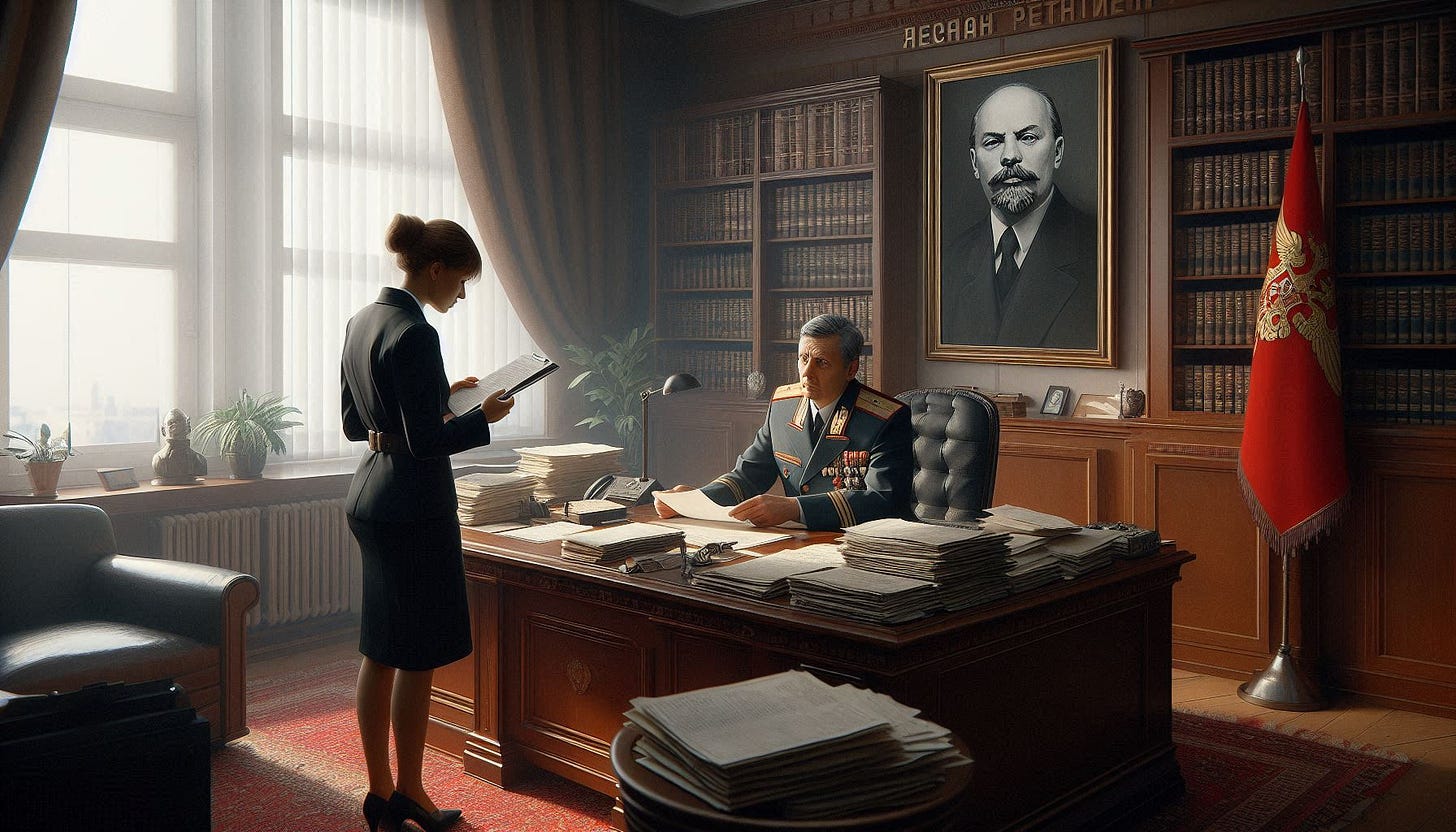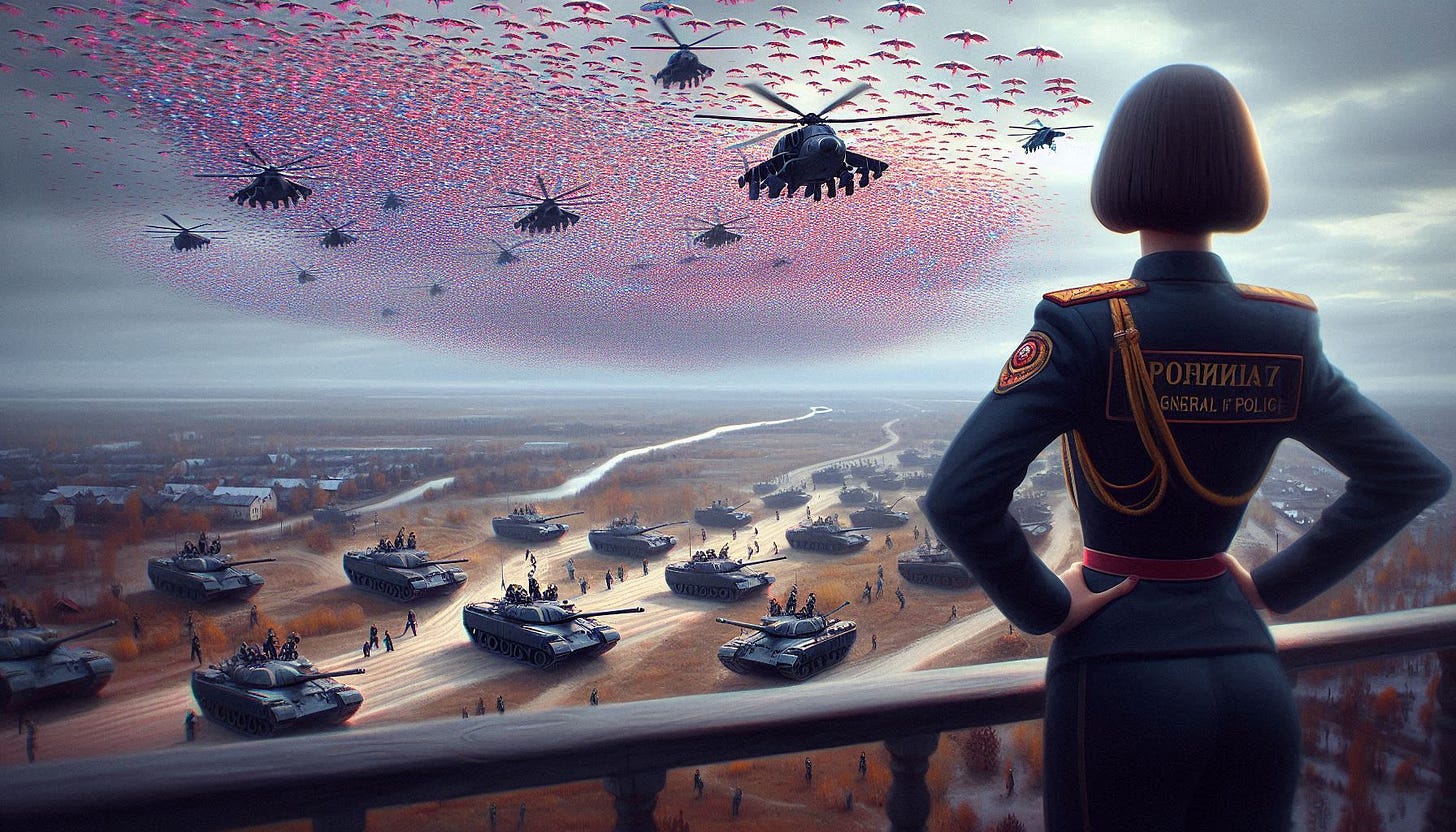The Swarm
With the latest iteration of Chinese fireworks, the balance of power in Europe—and indeed, the world—has shifted dramatically.
Oct 4, 2024 ANKA Daily News:
Zero Hour — Somewhere on the Eastern Ukrainian Border
Ants. That's what they looked like from a distance. A dark, undulating cloud of insects, swarming across the horizon as the first rays of dawn broke over the Ukrainian steppes. But these were no ordinary ants.
From the balcony of his office in Bryansk, Colonel General of Police Taras Shevchenko squinted through his binoculars, trying to make out details of the strange formation approaching from the west. Years of training as a counter-intelligence officer for the Federal Security Service, or FSB (Федеральная служба безопасности) had honed his instincts. Something wasn't right.
"Command, this is Outpost Gamma. We have unidentified aerial objects incoming, bearing two-seven-zero. Estimate... tens of thousands. No, hundreds of thousands. Correction—millions. Request instructions, over."
Static crackled over the radio. Shevchenko's stomach tightened as he waited for a response that didn't come.
The swarm drew closer, resolving into distinct shapes. They were drones—thousands upon thousands of miniature flying robots, each no larger than a sparrow. As they neared, Shevchenko could make out the sleek, matte black bodies, swept-back wings, and ominous bulges that could only be explosive payloads.
A deafening roar filled the air as the swarm passed overhead, stretching from horizon to horizon. The drones moved with uncanny precision, weaving complex patterns as they adjusted formation. It was like watching a murmuration of starlings if starlings carried enough high explosives to level a city block.
Shevchenko's radio again crackled. "All units, this is Command. Unidentified drone swarms detected across the entire eastern front. Assume hostile and engage at will. Repeat, weapons free."
But it was too late. As Shevchenko watched in horror, the swarm split into dozens of smaller groups, each homing in on a different target. Fireballs blossomed across the landscape as Russian command posts, ammunition dumps, and vehicle parks vanished in thunderous explosions.
The carnage unfolded with terrifying speed and efficiency. Within minutes, the entire defenses of the city—the entire Red Army there—had dissolved into chaos. Shevchenko could only stare in disbelief as years of a deep behind-the-lines military buildup were erased in the blink of an eye.
His shock was interrupted by a hand on his shoulder. "Sir, we need to go. Now." It was Major Kovalenko, her face pale but determined. "There's nothing more we can do here."
Shevchenko nodded numbly, allowing himself to be led to a waiting vehicle. As they sped away from the city, the building from which he had just come erupted into a fireball and toppled over. He couldn't shake the feeling that he had just witnessed the dawn of a new era in warfare. One that would change everything.
Project Mesilane
Zero Minus 72—Tallinn, Estonia
Dr. Liisa Tamm hunched over her workbench, carefully adjusting the minuscule components of the drone prototype. After months of painstaking work, they were finally ready for the final test flight. She glanced at the clock—3:47 AM. The rest of the team had long since gone home, leaving her alone in the cavernous underground laboratory.
A soft chime from her computer interrupted her focus. New message. Probably just another status update from the production facility. They'd been working around the clock to churn out millions of the tiny drones, each one a marvel of miniaturization and artificial intelligence.
Liisa's blood ran cold as she read the message:
Her fingers flew across the keyboard, initiating the self-destruct sequence for all project data. Alarms blared throughout the facility as blast doors slammed shut, sealing off sensitive areas.
Liisa's mind raced. How had they been discovered? They'd been so careful, compartmentalizing information and using multiple layers of security. The project codenamed “Mesilane" was one of the most closely guarded secrets in the country.
As she rushed to secure the prototype, a figure stepped out of the shadows. "I wouldn't do that if I were you, Dr. Tamm."
Liisa froze. She recognized the voice—it belonged to Natalia Sokolova, a visiting researcher from Ukraine. But the gun in Natalia's hand told a different story.
"Step away from the workbench," Natalia ordered, her voice cold and professional. "Hands where I can see them."
Liisa complied, her mind whirling. "You're not Ukrainian, are you?"
Natalia smiled thinly. "Very perceptive. Now, you're going to tell me everything about Project Mesilane. Starting with how to enable the self-destruct sequence."
Cat and Mouse
Zero Minus 36—FSB Office, Bryansk, Russia
General Shevchenko pored over the intelligence reports scattered across his desk. Something big was brewing, but he couldn't quite put his finger on it. Increased chatter, unusual troop movements, and cryptic messages intercepted from Ukrainian military channels. All the pieces were there, but the picture remained frustratingly unclear.
A knock at the door interrupted his thoughts. "Come in," he called.
Major of Police Olena Kovalenko entered, looking troubled. "Sir, we've got a situation. One of our deep-cover agents in Estonia just went dark. The last transmission mentioned something called 'Project Mesilane' before cutting off."
Shevchenko frowned. "Mesilane... that's Estonian for 'bee,' isn't it? Any idea what it refers to?"
Kovalenko shook her head. "Nothing concrete. But there are rumors of some kind of secret weapons program. Something that could tip the balance of power in the region."
"And now we've lost contact with our agent," Shevchenko mused. "That can't be a coincidence. Alright, Captain. I want you to dig deeper. Use every resource we have. If this 'Project Mesilane' is as important as it seems, we need to know about it."
As Kovalenko left to carry out her orders, Shevchenko turned back to the reports on his desk. The pieces were starting to come together, forming an intriguing and terrifying picture. If his suspicions were correct, the world was about to change forever.
The Sting
Zero Minus 12—Narva, Estonia
Natalia Sokolova—her real name was Yelena Volkova, but she'd been Natalia for so long it was hard to remember sometimes—huddled in the car garage, shivering despite the warm night air. She'd managed to escape the Tallinn research facility with a treasure trove of data on Project Mesilane, but she knew it was only a matter of time before they—Estonian counterintelligence—caught up with her.
Her handlers in Beijing were getting impatient. They wanted the information now, before it was too late. But Yelena knew better than to risk a direct transmission. The Estonians and their NATO allies had ears everywhere. She had set a rendezvous with her Chinese control for this location.
A noise outside made her freeze. Footsteps, trying to be stealthy but not quite succeeding. Yelena drew her pistol, every nerve on edge.
The door creaked open, and a familiar figure stepped inside. "You can put that away," General Shevchenko said, his hands raised in a gesture of peace. I'm not here to arrest you."
Yelena's grip on the gun tightened. "How did you find me?"
Shevchenko smiled wryly. "You're good, I'll give you that. But not quite good enough. We've been tailing you for weeks. Just waiting to see where you'd lead us."
"And now?" Yelena asked, her voice steady despite the fear churning in her gut.
"Now, we talk," Shevchenko said, sitting down on a crate. You have information we need—information about Project Mesilane."
Yelena's mind raced, weighing her options. She could try to shoot her way out, but Shevchenko undoubtedly had backup nearby. She could make a run for it, but where would she go? If the Russians had found her here, her control agent was compromised… or dead. The border was too far, and every intelligence agency in the region would be looking for her.
In the end, survival won out over loyalty. "Alright," she said, lowering her weapon. "I'll tell you what I know. But I want protection. A new identity, somewhere far away from all this."
Shevchenko nodded. "That can be arranged. Now, tell me about the bees."
Zero Hour
Dawn—Eastern Ukraine
The swarm moved with terrifying efficiency, guided by a distributed artificial intelligence that allowed each drone to act independently while still coordinating with the larger group. They struck with surgical precision, targeting command and control centers, air defense systems, and key logistics hubs.
Russian forces, caught completely off guard, could do little but watch in horror as their carefully laid defenses crumbled. Tanks and armored vehicles, once the pride of the Russian military, were reduced to smoking hulks. Aircraft were destroyed on the ground before they could take off, or in the air, their turbine intakes set ablaze as they swallowed UAVs whole.
By mid-morning, the entire front had collapsed. What remained of the Russian forces were in full retreat, abandoning equipment and fleeing in panic. The swarm pursued relentlessly, harrying the retreating columns and preventing any attempt to regroup or counterattack.
General Shevchenko, monitoring the situation as he sped towards Moscow, could scarcely believe the reports coming in. "It's not just a victory," he murmured to Major Kovalenko. "It's a rout. A complete and total defeat."
Kovalenko nodded, her face a mix of awe and concern. "But sir, what happens when the swarms run out of targets at the border? Where will they go next?"
Shevchenko's expression darkened. "That, Captain, is the million-dollar question."
Endgame
Dusk—The Kremlin, Moscow
The swarm hovered on the outskirts of Moscow, a dark cloud blotting out the setting sun. In the Kremlin, frantic officials debated their options, but the truth was painfully clear—they had no defense against this new weapon.
As his office in Bryansk Shevchenko had been analyzing the trove of data retrieved from Estonia. He had relayed to Moscow that each squad of these small, AI-enabled, aerial drones carried an explosive charge large enough to destroy a 4-story building, that they networked in a fashion similar to Chinese fireworks light displays to swarm, that they could individually, autonomously detect and evade incoming countermeasures, and that they were programmed to attack targets of opportunity in autonomous breakaway squads.
While the FSB and Red Army chiefs had assumed that Mesilane was still in early development in a Tallin laboratory, the Estonians had already manufactured, equipped, and deployed tens of millions of these drones and had moved them to launch positions along the Russian border over the previous week. The prototype that the late Liisa Tamm had been working on when she encountered Natalia Sokolova was a next-generation version, but the versions now flying toward Moscow were more than up to their assigned tasks.
When the first border attack came, radio jamming seemed to have no effect. Bombardment with chaff from helicopters and fighter jets was useless and suicidal for the pilots. Bullets and rockets did not phase the swarms which effortlessly dispersed and regrouped as they advanced.
The sudden, unexpected dawn attack had not merely struck the previously well-defended positions of the Russian Army, Navy and Air Force, but it had completely obliterated them to the point of leaving behind neither prisoners nor war materiel.
In Moscow, just as panic was about to set in, the swarms advancing in from the outskirts abruptly paused. Instead of advancing on the city, they turned and began flying west, back the way they had come. If, as Clausewitz had said, war is a continuation of politics by other means, it did no one any good to decapitate one of the negotiating partners.
Stepping out of his car and looking up at the sky, Shevchenko watched the swarm's retreat with mixed emotions. They had won a stunning victory, but at what cost? And what would the world look like tomorrow?
As if reading his thoughts, Kovalenko spoke up. "Unleashing something like this... it changes everything."
Shevchenko was silent for a long moment before responding. "War has always been about technological advantage, Major. The longbow, gunpowder, nuclear weapons—each changed the face of warfare. This is just the next evolution."
"But where does it end?" Kovalenko pressed. "Today it's Russia. Tomorrow, who knows?"
Shevchenko had no answer for that. As night fell, he watched the last of the swarm disappear over the horizon, returning to their secret hangars to recover and recharge. The world had changed today, and for better or for worse, there was no going back.
In the coming days, the full impact of Project Mesilane would become clear. The balance of power in Europe—and indeed, the world—had shifted dramatically. Old alliances would be tested, new ones forged in the face of this revolutionary technology.
And somewhere in a nondescript office building in Tallinn, Dr. Liisa Tamm’s successor was already hard at work on the next generation of drones. Smaller, faster, more intelligent. The arms race of the 21st century had begun.
As for Yelena Volkova, she watched the events unfold on a television in a small apartment in Buenos Aires, her new home, courtesy of General Shevchenko. She raised a glass to the screen, offering a silent toast to the future.
The age of the swarm had arrived.
Meanwhile, let’s end these wars. We support peace in the West Bank and Gaza and the efforts to bring an immediate cessation to the war. Global Village Institute’s Peace Thru Permaculture initiative has sponsored the Green Kibbutz network in Israel and the Marda Permaculture Farm in the West Bank for over 30 years and will continue to do so, with your assistance. We aid Ukrainian families seeking refuge in ecovillages and permaculture farms along the Green Road and work to heal collective trauma everywhere through the Pocket Project. You can read all about it on the Global Village Institute website (GVIx.org). Thank you for your support.
Help me get my blog posted every week. All Patreon donations and Blogger, Substack and Medium subscriptions are needed and welcomed. You are how we make this happen. Your contributions can be made to Global Village Institute, a tax-deductible 501(c)(3) charity. PowerUp! donors on Patreon get an autographed book off each first press run. Please help if you can.
#RestorationGeneration.
當人類被關在籠内,地球持續美好,所以,給我們的教訓是:
人類毫不重要,空氣,土壤,天空和流水没有你們依然美好。
所以當你們走出籠子的時候,請記得你們是地球的客人,不是主人。
When humans are locked in a cage, the earth continues to be beautiful. Therefore, the lesson for us is: Human beings are not important. The air, soil, sky and water are still beautiful without you. So, when you step out of the cage, please remember that you are guests of the Earth, not its hosts.
We have a complete solution. We can restore whales to the ocean and bison to the plains. We can recover all the great old-growth forests. We possess the knowledge and tools to rebuild savannah and wetland ecosystems. It is not too late. All of these great works are recoverable. We can have a human population sized to harmonize, not destabilize. We can have an atmosphere that heats and cools just the right amount, is easy on our lungs and sweet to our nostrils with the scent of ten thousand flowers. All of that beckons. All of that is within reach.













